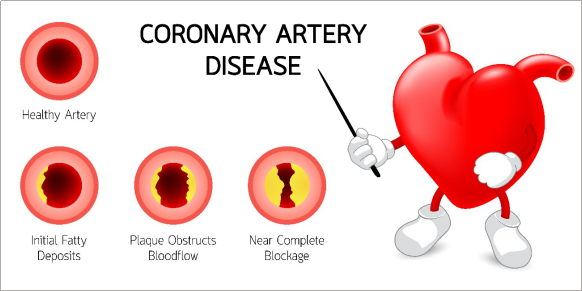
Written by
Updated :
Reviewed by
Cardiovascular diseases have emerged as the leading cause of death in India, affecting both the urban and rural populations (Source: ResearchGate). Truth be told, more than a quarter of all mortality in India is attributable to cardiovascular diseases.
Most people view heart disease as a single condition affecting the heart. However, heart diseases are of different types, each with many different root causes. While some are congenital in nature, others develop over a period and affect individuals later in life.
You will find four common heart diseases listed below -
1. Coronary Artery Disease (CAD)
Coronary Artery Disease is a condition in which coronary arteries (responsible for supplying blood to the heart) are blocked. Cholesterol-containing plaque in the arteries is usually to blame for coronary artery disease.
Building up of plaque narrows the coronary arteries and decreases blood flow to the heart. The diminished blood supply may cause shortness of breath or angina (chest pain). And the case of complete blockage can result in a heart attack.

(Image Credit: Shutterstock)
Coronary Artery Disease |
||
Symptoms |
Risk Factors |
Prevention |
| Chest pain | High blood cholesterol levels | Stay physically active |
| Burning | Smoking | Quit smoking |
| Shortness of breath | Obesity | Eat a diet rich in vegetable, fruits, and whole grains |
| Heaviness | Inactivity | Maintain a healthy weight |
| Dizziness | Hyperglycemia/diabetes mellitus | Reduce and manage stress |
| Tightness | Emotional stress |
|
| Squeezing | Unhealthy eating habits |
|
|
Excessive alcohol consumption |
|
2. Myocardial Infarction (Heart Attack)
A heart attack transpires when one of the coronary arteries has extremely slow blood flow or is blocked suddenly. The usual cause of sudden blockage is the formation of a blood clot,i.e.thrombus.
The blood clot typically forms when the fatty deposits or plaque ruptures. It then acts as a dam, blocking the blood flow beyond the clot. As a result, that part of the heart completely loses its blood and eventually, the muscle dies. This is called a myocardial infarction.
Heart Attack |
||
Symptoms |
Causes |
Prevention |
Extreme weakness and shortness of breath |
Obesity |
Quit smoking |
Discomfort and pain in the chest |
High blood pressure |
Avoid consumption of fatty and oily food |
Nausea and vomit |
High cholesterol |
Exercise regularly |
Rapid or irregular heartbeats |
Diabetes |
Eat a healthy diet |
Sweating and dizziness |
|
Avoid excessive consumption of alcohol |
3. Arrhythmia
In normal cases, the heartbeats between 60 and 80 times/minute; however, due to arrhythmia, the heartbeats in an irregular pattern or too quickly, or too slowly. The abnormal functioning of the heart’s electrical system can cause the heart to beat erratically.
Typically, there are two main types of arrhythmias, with many conditions under these two categories:
1. Bradycardia - slow heartbeat
2. Tachycardia - rapid heartbeat
Arrhythmia |
||
Symptoms |
Causes |
Prevention |
Lightheadedness or dizziness |
Heart disease like congestive heart failure |
Avoid nicotine, drugs, alcohol, caffeine |
A fluttering in the chest |
High blood pressure |
Eat a heart-healthy diet |
Fast or slow heartbeat |
Alcohol or drug abuse |
Reduce high blood pressure |
Skipping beats |
Diabetes |
Control cholesterol levels |
Sweating |
Mental stress |
Enjoy regular physical activity |
Shortness of breath |
Some dietary supplements |
Lose excess weight |
4. Heart Failure
While the term may sound alarming, heart failure does not imply that the heart has stopped working or it has failed. It implies the heart doesn't pump blood just as it should.
Over a period of time, conditions, like coronary artery disease or high blood pressure, can leave the heart too weak to pump efficiently. While, all conditions leading to heart failure cannot be reversed, but the signs and symptoms of heart failure can be improved by treatments, which can help a person live longer. Heart failure has now become a significant health problem in India, affecting even the relatively younger population.
Heart Failure |
||
Symptoms |
Causes |
Prevention |
Fatigue and weakness |
Congenital heart defect |
Avoid food high in salt, sugar, and fats |
Persistent wheezing or coughing |
Heart attack |
Quit smoking |
Tiredness, fatigue |
Heart valve disease |
Reduce alcohol intake |
Increased or irregular heartbeats |
Diabetes and high blood pressure |
Get enough sleep |
The buildup of excess fluid in body tissues |
Drug or alcohol misuse |
Stick to a healthy weight |
Insure Your Heart the Right Way -
One of life’s greatest gifts is “good health”, and every individual must take good care of it. Therefore, it goes without saying that a healthy heart translates to a happier life.Unfortunately, the sedentary way of life and unhealthy eating habits have taken an enormous toll on our heart health. It has intensified the risk of heart disease even among the younger generation.
As per the statistics published in The Lancet and its associated journals:
1. From 1990 to 2016, the occurrence of heart ailments in India has increased over 50 percent
2. Heart disease is the leading cause of disease burden in India
3. The contribution of heart diseases to total death burden in India has doubled in the past 25 years
Moreover, heart ailments require expensive medications and surgeries. This means that individuals who aren’t financially secure can easily crumble under the burden of the treatment cost. Luckily, one of the growing insurers in India, including Max Life, have stepped up and introduced term plans with critical illness cover to help individuals cope up with the expensive treatment costs of critical illnesses like:
1. Heart diseases
2. Cancer
3. Kidney failure
4. Stroke and so forth
For instance, Max Life Insurance has introduced Max Life Smart Term Plan (UIN:104N113V04; Non Linked Non Participating Individual Pure Risk Premium Life Insurance Plan) with“Accelerated Critical Illness Cover” (optional cover) that helps the insured individual to avail immediate financial help in the form of accelerated payouts in case of critical illness diagnosis.
With this comprehensive financial protection, you will no longer have to worry about hospital bills and treatment costs of critical illnesses and can divert all your focus on recovery. Besides this obvious benefit, here are a few more ways how an ‘Accelerated Critical Illness Cover” will help you: -
1. Covers against as many as 40 critical illnesses
2. Affordable premiums
3. Lump-sum payout regardless of actual treatment expenses incurred
4. Tax benefits (u/s 80D)
Although we can't foresee the future, we can at least plan financially for the untoward contingencies. Opting for the “Accelerated Critical Illness Cover ” along with the Max Life Smart Term Plan (UIN:104N113V04; Non Linked Non Participating Individual Pure Risk Premium Life Insurance Plan) is a practical way to plan for critical illness-related emergencies.
References:
https://www.healthline.com/health/coronary-artery-disease
https://www.healthline.com/health/acute-myocardial-infarction
https://www.medicalnewstoday.com/articles/8887.php
https://www.healthline.com/health/heart-failure
https://www.thelancet.com/journals/langlo/article/PIIS2214-109X(18)30407-8/fulltext
ARN:- 12012021/Blog14-M20


